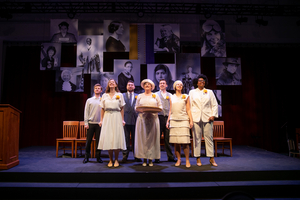Review: WHEN THERE ARE NINE at KC Lyric Opera

It wasn't until very near the end of When There Are Nine, when the musicians shuffled behind the stage and into some black robes, that I realized what the show had been reminding me of. The production, a program of songs about the fight for women's suffrage, is part of Lyric's "Explorations" series, in which smaller, more intimate productions are given between the four main operas of the season.
Very often these have been challenging, interesting bits of theatre, ample training grounds for young voices coming through the company's apprenticeship program. And indeed, it must be said that the principals all delivered in fine tone. But the production inself, it has to be said, reminded this reviewer of nothing more or less than a school pageant, complete with a grit-free version of history and a selection of songs that could be called eclectic.
Let us be frank: the fight for women's suffrage was not a pretty thing at all. One need hardly crack open a history book to see the violence with which it was opposed. There is a reason the movement took over 70 years to succeed - actually, several. Some were purely economic, a large number predicated on the idea that women would vote for the "wrong" things, but a sizable percentage of opponents - including a surprising number of women - opposed it simply because it went against the notion of what a "proper woman" should do. Likewise, there was considerable strife within the movement, as to what role nonwhite women would play in the campaign, and what benefits they could hope to reap. This is touched on lightly in the program, but only lightly.
The highlight of the evening is "And Still We Dream", a new song cycle making its debut in the show. The piece is taken from the writings of Susan B. Anthony and Elizabeth Cady Stanton, two women who were of course part of the foundation of the movement. The cycle, sung by the very capable mezzo Samantha Gossard, takes us back and forth between the two women who, though they lived very different lives, were nonetheless two parts of one mind when they worked for the cause. The Esterhazy Quartet must be noted here for their accompaniment work. One finds oneself suspecting that, the song cycle not being long enough to support its own show, the rest was erected as scaffolding around it to bring it up to length.
Reader Reviews
Videos

